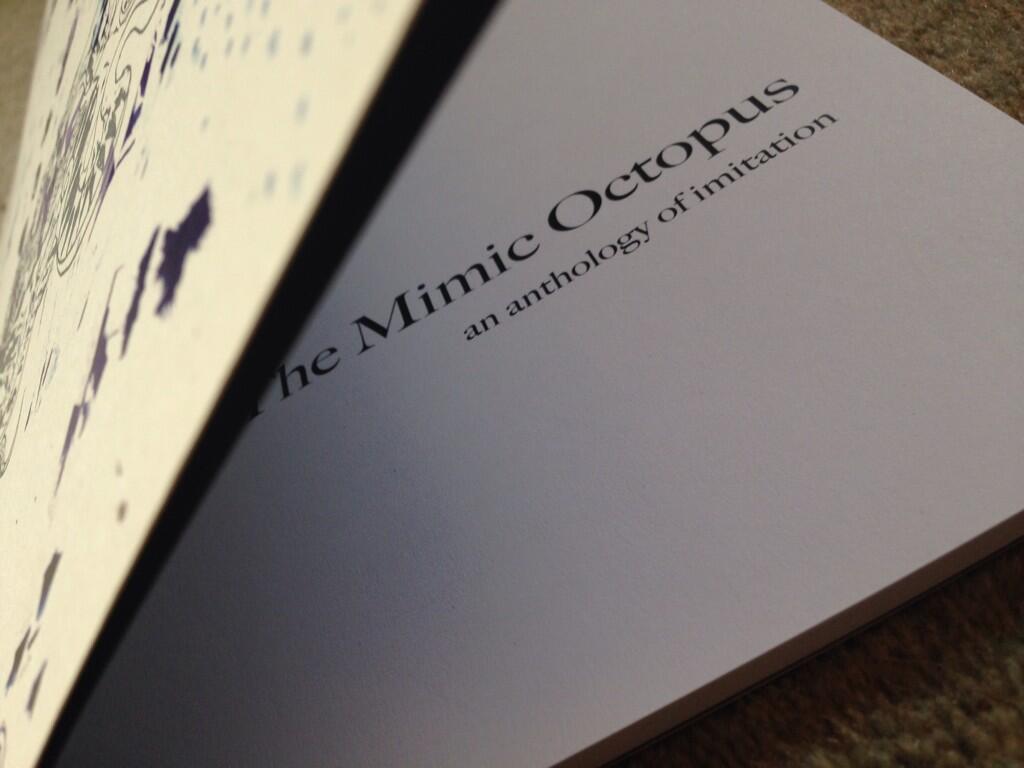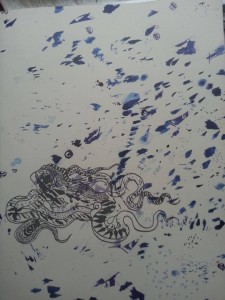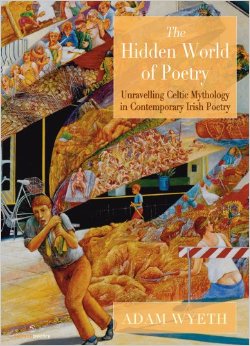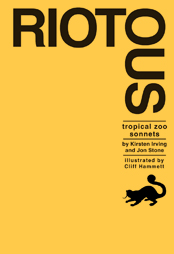Mimic Octopus: an anthology of poetic imitation (ed. Will Harris & Richard Osmond)
-Reviewed by Ira Lightman–
A “mimic octopus” isn’t a chameleon, a mere canvas. It mimes its whole body to act like another creature: either unpalatable prey or a fearsome predator. The main weakness of The Mimic Octopus is that almost no poet here takes such a steer from a source poem. The poets’ poems would fit better in their own collections than in an anthology of the art of translation and imitation – and such anthologies usually think harder about whether derivation should sit next to the original or work in its own right. In an anthology of imitation, we should ask is the imitation working as a poem for any poetry community or any time, or as a poem by that particular poet?
The website gives the list of imitatees the poets are imitating. The chapbook doesn’t. Neither give the titles of actual poems worked from, as an anthology would. Instead there is room for tangentially related and at best pleasantly diverting scans of drawings and collage art around the poems. The only poetry anthologies I know (usually four times the length of this chapbook) with ubiquitous artwork are Grandchildren of Albion (1991), in which the artwork works well, and anthologies of children’s poetry and established classics. One picture in The Mimic Octopus is of an ambulance parked in the corner of an empty urban car park, between one male poet’s poem to a naked woman in the bath and another male poet’s poem to a naked woman’s naked arse.
Some of the sources are presented in this review, and perhaps have not been asked for or seen by the editors wanting to enter the heavyweight debates as they say they do. We need more answers than a gosh-gee aphorism like
What separates a painting by one Dutch master from another in his school? The texture of a fur cap or an embroidered cloak, perhaps… Only through craft can we hope to discover such brilliant anonymity.
– (in this chapbook, it certainly is “his school”). The risk of generic anonymity is becoming Rupert Pupkin, with studied imported passion, and professionalism to ward off feet-shuffling embarrassment. Is The Mimic Octopus a book all the poets named on the website, including the passionate ones, could enter? If not, then it’s not about craft. Previous ages of English poetry have held Latin as a model of compression and stony form. William Wycherley, while he would have enjoyed the (to me, also, fun) smut of Andrew Zurcher’s ‘Upon his lover’s backside’ would never have written
Rain down, kind heavens, easing lubricants
to slip the sphincter of my eloquence.
because it’s a mess. The 20th century poet Douglas Oliver once explored the etymology and feel of the word “kind” while using it – here it’s waffle like Peter Cook improvising cod Shakespearean pentameter. How does rain ease? If there is a lubricant, “easing” is a superfluous word. Doesn’t “slip” mean “escape”, not, again, lubricate? (A Freudian slip of wanting out, perhaps?)
Some of the poets here imitate poems by each other – sadly, the imitated poems by the also-writing poets are not in the book. Paul Muldoon has a poem to ‘Alvaro de Campos: Belfast 1922’ and a poem ‘Sushi’emulated loosely by Mina Gorji:
But they don’t have a heart,
you said.
We moved on to dessert-
further apart-
your thoughts soon turned
to horseshoe crab.
Manoeuvre past
its unimpressive claws,
infiltrate
the armament
of oval shell……Along the coast
the horseshoe crab
scuttles away-
alone in the Creation.
The pattern from Muldoon is (as with many of the poems here) taken at arm’s length and myopically. Here is some of ‘Sushi’
“Why do we waste so much time in arguing?”
We were sitting at the sushi-bar
drinking Kirin beer
and watching the Master chef
fastidiously shave
salmon, tune and yellowtail…I saw, when the steam
cleared, how this apprentice
had scrimshandered a rose’
exquisite petals…Is it not the height of arrogance
to propose that God’s no more arcane
than the smack of oregano,
orgone,
the inner organs
of beasts and fowls, the mines of Arigna,
the poems of Louis Aragon?…
the Master so gravely weighed
from hand to hand
with the look of a man unlikely to confound
Duns Scotus, say, with Scotus Eriugena.
Glory is not borrowed for Gorji without uncomfortable comparison coming too. She lacks scrimshandering in her vocabulary. Muldoon puts his opening line in speech marks. Gorji italicizes, both there and in the middle of her poem, and in the middle it is no longer with the advantage of surprise or a clear graphic design on the page (a problem with this chapbook generally). She has a shuffling non-committal waffly ending line, and too little detail. The poem feels addressed to others who go on restaurant dates far more than I or Muldoon’s old childhood pals do. There is an assumed, narrow audience.
One can be grateful that Gorji does not wallow in Muldoon’s trademark echoing cognates. His oregano, organs, and orgone; Duns Scotus and Scotus Eriugena. As with Hill, it’s not so much a unique style as having bought up all the puns in the lexicon. If imitations could free this up, then good.Muldoon in his Oxford Lectures on Poetry dwells on possible associations, echoing cognates, that any one word in a de Campos poem may throw up in the subtle reader’s mind. His poem here names Barrow-in-Furness but is set in and about the 1922 Belfast shipyards. Pessoa imagined de Campos was an engineer working in another country at the same time, in Barrow-in-Furness (where Pessoa never visited). The website says de Campos is Muldoon’s imitatee, but Muldoon seems to be doing no more than imagining a place (of the past) he has never visited, as Pessoa did.
Consider de Campos’s poem to Barrow-in-Furness. It’s not like this one. Muldoon has the line “…the dun in dunnock/ doesn’t allow for the dash/of silver in its head and throat feathers”. All very nice, less taut than in ‘Sushi’, Muldoon imitating himself, and not escaping this by working on de Campos.
…the dunchered shipyard men are no less peaceable
than those of Barrow-in-Furness.
Souped-up, staid, swerveless, supple,
they hold in equal reverencethe penny whistle and the plenilunar
pigskin of a Lambeg drum…
This isn’t de Campos. Pessoa saw de Campos as his Whitmanesque self, and slapped exclamation marks all over him:
…Corre, raio de rio, e leva ao mar
A minha indiferença subjetiva!
Qual “leva ao mar”! Tua presença esquiva
Que tem comigo e com o meu pensar?(from Barrow-in-Furness, a sonnet sequence by de Campos)
Roughly this translates
…Run, damned river, and lead to the ocean,
my indifference’s subjectivity
which “leads to the ocean”! Your presence, slippery,
holding in me, in my inner thinking..
Muldoon has a lovely implication here that the Belfast shipyard men, “souped-up, staid, swerveless, supple”, are like the Furness river as de Campos writes about it (without having seen it, so it could be any river). This is a generosity towards other humans not easily found in de Campos, moodily and narcissistically brooding on existential questions and elemental forces. If one knows de Campos, one sees Muldoon’s clever repurposing. One questions, though, why Muldoon is idealising the unthinking brute workmen. Why is he flattering them for being swerveless when they were both unstinting and did swerve, not to die of heavy moving metal ship parts, and probably didn’t have long retirements after all that stress? Pessoa leaves the better aftertaste with his more openly sad and more brusquely comic poetry (at his own expense).
For me, Sarah Howe’s riffing against the tone of the Cathay poems of Ezra Pound is the only triumph in the chapbook. The tone is well chosen and languid. The self-reflexive fascination with penmanship to describe the insects buzzing by the river and all the movement isn’t narcissistic but effective. No audience is assumed, and the background of the Jesuits landing at Canton is informative for all. If we are told new things, we are put into the poem from all our communities and see each other thinking there. Howe’s poem is hard to quote because it flows so well part to part.
And then I come back to carping. The Andrew Motion poem in the book seems to show the poet having learned little from his public run-in with the World War 1 historians whose work he used in found poems a few years ago. Admitted, the tone of his poem is refreshing as one turns to it from the other poems in the chapbook
When the time came to see them off-the-cuff
I dressed laboriously in a wool vest and long drawers.
a shirt and two sweaters,
comfortable knickerbockers made of windproof gabardine,
a pair of soft elastic Kashmir putties,
ankle-boots soled with English leather
and nailed with Alpine nails,
a fur-lined cycling helmet,
goggles,
and a leather mask covering every part of my face
not protected by my beard.
A thick grey hand-knitted muffler completed the costume.
The chapbook gives no context. The website says Motion’s imitatee is Wade Davis. But these lines are by Edward Norton, from an account of the 1924 Everest climb in which men died, quoted by Davis in his Into the Silence: The Great War, Mallory, and the Conquest of Everest:
Personally I wore thick woolen vest and drawers, a thick flannel shirt and two sweaters under a lightish knickerbocker suit of windproof gaberdine the knickers of which were lined with light flannel, a pair of soft elastic Kashmir putties, and a pair of boots of felt bound and soled with leather and lightly nailed with the usual Alpine nails. Over all I wore a very light pajama suit of Messrs Burberry’s “Shackleton” windproof gabardine. On my hands I wore a pair of long fingerless woolen mits inside a similar pair made of gaberdine. On my head I wore a fur-lined motor-cycling helmet, and my eyes and nose were protected by a pair of goggles of Crooke’s glass, which were sewn into a leather mask that came well over the nose and covered any part of my face which was not naturally protected by my beard. A huge woolen muffler completed my costume.
I don’t know if Motion naturally corrected “gabardine” in his poem, as it is spelled with e and a in Davis. He certainly has corrected to add lightness, and the word “goggles” by itself on a line is lovely, and well-quarried from the original. My joy, though, at skimming Motion’s poem settled into unease and a bad taste in the mouth. In his poem Motion retells Wade’s retelling (from journals of different men on the expedition) of how Mallory and Irvine were lost but one member of the party thought he saw two dots like Mallory and Irvine ahead on the ascent, in a setting so mesmerizing the writer could believe that he had had a vision of how Mallory could have been bewitched by it and not turned back, despite the likelihood he would die, which he did. Many dispute that it could have been Mallory in this (perhaps) vision. Mallory wasn’t found until 1999.
Motion has reshaped Norton’s paragraph into very pleasant verse. More Lowell-like than the Robert Lowell tribute in The Mimic Octopus by André Naffis-Sahely (spelt “Naffs” on the website). Indigestibilities remain, and translations and imitations less effective than the original or existing translations.
A poet who works from historical sources like Ezra Pound would never have flattened the distance between then and now in the name of a giggly frisson of mocking a dandy (who wasn’t a dandy). Pound would have been fascinated by the sources, and have let their quiddity come through. Again, the octopus has swum into view, and had nothing but a few pictures projected onto him. Motion seems himself too present.
Worse, it wasn’t Norton who had the vision of Mallory (probably already dead) at the end of Motion’s poem. It was Odell, another member of the expedition, whose words are also used by Motion as part of the borrowed words of the same one narrator. If this “Norton-Odell” compound is meant to convey a rollicking ghost story in the generalised tone of the time, it’s at most a limited success, and ghoulish. They’re dead, when am I going to be? it seems to say, up to the final two lines
It was the beginning of their mystery and no mystery at all.
There is no other reason that explains why they chose to stay.
Which aren’t in Davis, from what I can see.
Finally, I was glad that Anthony Adler’s poem ‘Near Extremes, after Jon Stone’ led me to Jon Stone’s cluster of poems all called ‘Near Extremes’. Stone’s four poems (not included in The Mimic Octopus) all begin “Where I come from it’s the other way round” and then do some nice topsy-turvy work with expected tropes. They’re better than Adler’s pleasant enough homage of first drafty lines.
Stone’s imitation in The Mimic Octopus, though, is a prose poem based on Alan Jenkins. Jenkins shared the late 80s slightly porny tendency of Craig Raine when Raine ran out of similes, the big shot literary magazine editing bad boy. Unusually for The Mimic Octopus, Stone works sardonically on his source. But it doesn’t quite come off. As one would guess, many of Stone’s lines are quotes from Jenkins, though it’s interesting to observe which aren’t. Stone’s frames his quotes with hackneyed coy stage legalese. Stone stands against something sleazy. But vocalising for the Jenkins’ mentioned cat is unsuccessful. Adding “pliant whip”, making soap thin itself when it washes the beloved’s “nether parts” (Stone’s locution) and “traitor breast” (Stone) is awkward and clumsy. No narrative clues of setting, or progress over time, are in the Stone imitation, and not a lot of true daring with taste. One takes the overall point, that Jenkins’ poem is making exclusionary gestures, and Hugo Williams (quoted by Stone) on Jenkins is adding to the exclusion by calling it “daring”. Where though is the way forward, the actual new erotic poem in one’s hands?





